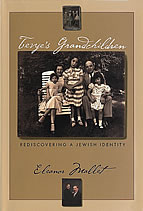|
Issue Contents :: Bookshelf :: Page [ 1 2 ]
Tevye’s Grandchildren:
Rediscovering a Jewish Identity
By Eleanor Mallet '65
The Pilgrim Press, 2004
Reviewed by Cynthia Dettelbach
 Eleanor Mallet, a former Plain Dealer columnist for 18 years, lived most of her life as a secular, assimilated American Jew. “Mine was a generation of Jewish invisibility, yet Jewishness at some level had a passionate center for me,” she writes. Eleanor Mallet, a former Plain Dealer columnist for 18 years, lived most of her life as a secular, assimilated American Jew. “Mine was a generation of Jewish invisibility, yet Jewishness at some level had a passionate center for me,” she writes.
She was driven to research and write about her Jewish identity in part by her two adult sons, Lou and Max, who had lived in Israel for a time. The epiphany came to her as she sat in her kitchen one day and listened to her sons laugh and joke with each other—in Hebrew. “They had an access to a Jewish language, culture, and sense of identity that I didn’t,” she writes. “I caught a glimpse of how constrained and circumspect my Jewishness was.”
Mallet decided to embark on a journey, traced in her book, into both Jewish history and to Israel itself, where she lived for two months. She also traveled to Germany, mainly to exorcise the shadow of the Holocaust, which she says is “something to understand and come to grips with, so it doesn’t control you.”
My favorite parts of the book deal with her experience in Israel. With a journalist’s eye and a no-longer dormant Jewish soul, she gets caught up in the unfolding scenes before her. Take, for example, her description of experiencing Tisha B’Av, a day commemorating the destruction of the first and second temples, as well as other catastrophes that befell the Jewish people.
At dusk on that day, she and Lou joined a “long quiet procession of people making their way to the Western Wall.” At the men’s side of the wall, “two men sat on the ground, back to back, supporting each other, chanting. A father chanted as his young son sat against him in tennis shoes and shorts, asleep, his mouth open, his hand on the prayer book. A man gestured constantly to the sky as if conducting.
“On the women’s side, a group of observant women stood together, one holding onto a crib on wheels with two babies in it. Modern Orthodox women were there, too—most standing, some rocking forward and back, davening (silent or whispered prayer uttered standing). A woman held her baby in her arms. He sucked his thumb and she rocked side-to-side, reading prayers. Another crib, momentarily unattended, contained a baby girl and her mother’s purse. I was struck by how seamless this religious observance was with daily life.”
Of her sojourn in the Jewish state, Mallet writes: “Visiting Israel transformed me, yet outwardly I was the same. I did not take up Orthodoxy, or find lost relatives or the perfect synagogue. But what did happen was that Jewishness in me found room to breathe and grow. The fractured pieces came together; I felt whole.”
In her concluding chapter, titled “Ritual,” Mallet describes a family Shabbat where Lou dons his knitted kipa, says the blessing over the Shabbat candles, and hugs the entire family. “It was not that long ago that I felt uncomfortable with such display of religiosity,” she writes, “even in the privacy of family.”
Cynthia Dettelbach is the editor of the Cleveland Jewish News.
Next Page >>
|





